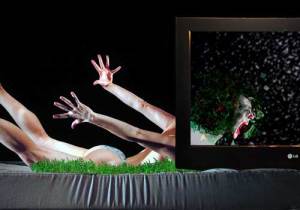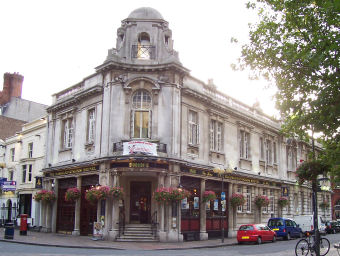 How do I meet SABRINA? That’s the question that’s occupying my mind at the moment.
How do I meet SABRINA? That’s the question that’s occupying my mind at the moment.
Not the Teenage Witch – well not especially. No, actually it’s SABRINAs (plural) of either gender. By which I mean Spiritually Active But Religious-Institution-Non-Affiliated. Another way of putting it is SBNR – Spiritual But Not Religious.
I hope that’s a self-explanatory term. I’m looking to hook up with people who are interested in spirituality or actively engaging their spirit, but who – as some of my publicity for my Sunday night pub conversations says – don’t do church.
Why?
Well first off, let me state clearly and categorically, not to convert them. It’s not my business to convert anyone. That’s not because I don’t think ‘conversion’ can happen in the conversational space I’m trying to create. But if, as I believe, the mystery we call ‘God’ is going to be active in that space then conversion is something that can and will happen for all and any of us. To put it more simply, I’m not trying to meet people and open up a conversation in order to persuade people to become christians. I’m not trying to gather an audience to hear me preach. This isn’t backdoor Alpha. There’s no programme or agenda that includes a vision of moving people from one place to another along a particular route. I just want to open up a conversation and see what happens.
So that’s why not. It still leaves the question of why?
My answer is to do with the mission of the Church but also something more personal. As you’re reading this, you might discover that what I’ve said so far seems more designed to answer the question for people who don’t have explicit christian faith than for those who do. I’m trying to reassure SABRINAs that I’m not out to get them. I’m genuinely interested in their experience and to create a space for genuine conversation.
That’s because as I’ve said before, what I’ve often encountered in churches is that people can be infantilised by learning a language that shapes and to a degree controls their world view. It’s very difficult to articulate in that space real doubt or struggle or, perhaps more subtly, to celebrate real moments of grace. I think we often miss them because we’re conditioned to look for them in very specific, structured ways that doesn’t help us to recognise the Spirit blowing where she pleases. Speaking personally, I find conversation with people who haven’t been conditioned in that way more stimulating, challenging and real. So one aspect of why is, to be honest, for me. It’s part of the attraction of working outside the bounds of what normally constitutes church.
But I am being paid by the Church. This isn’t just about me having the sort of conversations I enjoy and want to stimulate. So if it isn’t about getting bums on pews, what does it do for the Church’s mission? Well, it is possible of course that some bums might find their way onto pews through this. I’m not setting out to make that happen, but that doesn’t mean it can’t. I would celebrate if someone who was regularly part of the conversation found faith where they wouldn’t have said they had it before. I would celebrate too if there emerged from this a little community of people who were wanting to take a Jesus-shaped life more seriously. But again, I don’t think it’s even possible for me to make that happen, so I’m certainly not seeing it as my job. That allows me to relax and let God do whatever God does in the midst of that. I hope it allows others to relax too and not worry that they’ll come under any sort of pressure to adopt any particular belief system.
So do I bring anything to the table other than creating a space for this sort of conversation? I think so. Because the church isn’t all bad news as far as spirituality is concerned. That’s the great shame of our (somewhat deserved) bad press. The christian tradition does have a wealth of resources to offer those pursuing a spiritual life – particularly one earthed in real, everyday experience. What I can do, therefore, is to put those resources, indeed christian faith itself back on the agenda in the broader conversation about spirituality. At least for those who join me. There’s also a gentle challenge that I can offer to people to think about the value of being in the stream of a broad tradition, rather than simply being a free-floating individual. There’s something about the ‘bigger-than-usness’ of faith that means there’s value in negotiating faith in the midst of a community that includes not just those immediately present but those who have gone before too. (In the language of the Church: the Communion of Saints.)
So far, the group, being mostly people I know already, is numerically dominated, by people who would call themselves ‘christian’. (As I’ve said before, that’s a descriptor that is not always helpful.) I say numerically, because I don’t think that so far, those people are dominating. They have got it when it comes to the attitude to different viewpoints that I’m attempting to cultivate. And I value them all being there. But if I’m just gathering interesting/ed christians together, then it does kind of defeat the object.
So I’m going, somehow, to try and make contact with SABRINA and her friends. Perhaps a website, perhaps some cards to give out, perhaps some media stuff. And just some of that providence sort of stuff that can happen when you just hang about and meet people. I’ll let you know how it goes…
 ‘I’m seeing the tunnel at the end of all these lights.’
‘I’m seeing the tunnel at the end of all these lights.’ The day I came back from the consultation in Salisbury, my colleague Alex and I went to see an avant garde theatre production at the New Theatre Royal in the centre of Portsmouth.
The day I came back from the consultation in Salisbury, my colleague Alex and I went to see an avant garde theatre production at the New Theatre Royal in the centre of Portsmouth.
 I visited the Wetherspoon’s pub in the Guildhall Square. I was in the square to work out a site plan for the climate change vigil I’ve been arranging with the Diocesan Environmental Adviser.
I visited the Wetherspoon’s pub in the Guildhall Square. I was in the square to work out a site plan for the climate change vigil I’ve been arranging with the Diocesan Environmental Adviser.










 Lucky heather sir?
Lucky heather sir?
Recent Comments